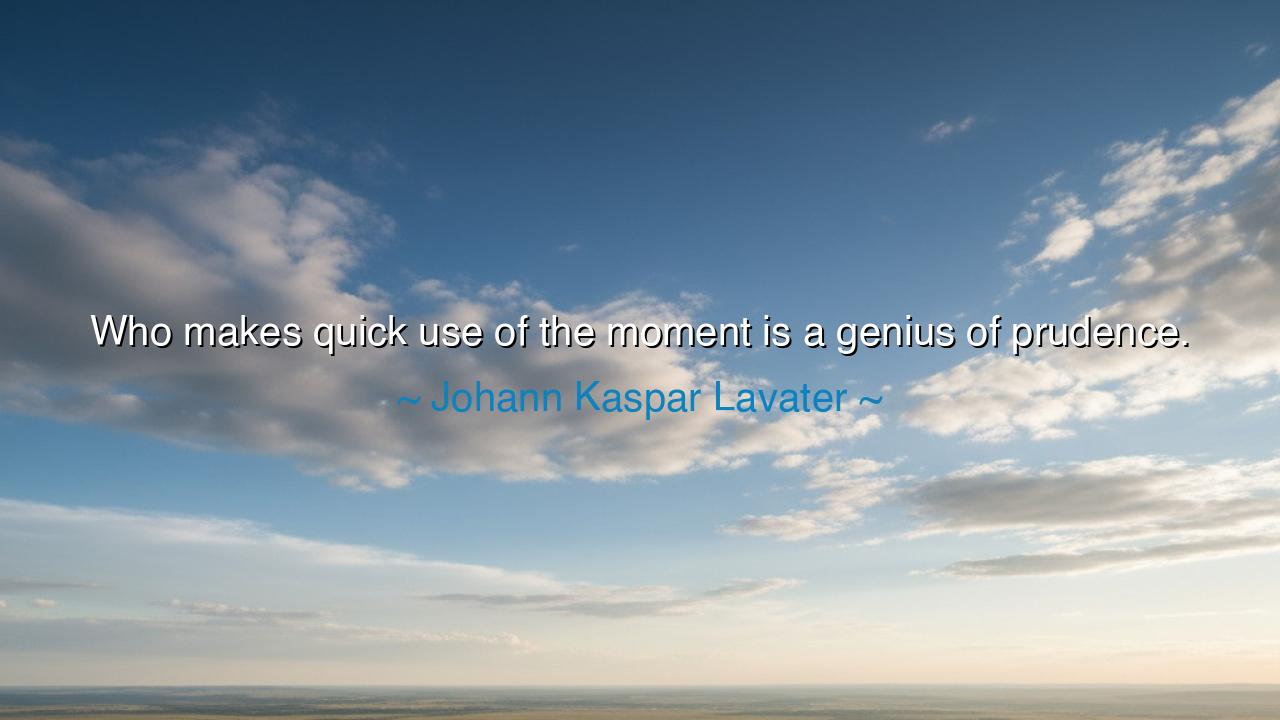
Who makes quick use of the moment is a genius of prudence.






Attend, O listener, to the wisdom of the ages. Johann Kaspar Lavater, in his piercing insight, declared: “Who makes quick use of the moment is a genius of prudence.” These words are not light ornaments of speech, but the distilled essence of life’s struggle. For the moment is fleeting, as sand through the hourglass, and prudence is the art of seeing what others pass by. To seize the instant, to act when destiny whispers but once, this is not rashness, but the highest genius.
The ancients taught us that time is the most precious of all treasures. Gold may be buried and found, kingdoms may fall and rise, but a moment, once lost, never returns. Prudence is not hesitation—it is the ability to discern the opportune instant and strike with decision. He who dithers is enslaved by regret; he who acts too soon is consumed by folly. But the one who acts swiftly at the right moment holds in his hand the power to change the world.
Recall, if you will, the tale of Julius Caesar at the Rubicon. Many counseled delay, many feared the wrath of Rome. Yet in that hour, Caesar beheld the balance of fate. To cross meant war; to retreat meant oblivion. With a single step, he made quick use of the moment, declaring “the die is cast.” That act of prudence—swift, bold, irrevocable—reshaped the destiny of an empire. History shows us that the genius of prudence is not cowardly caution, but timely audacity.
So too, let us remember a gentler tale, that of Florence Nightingale in the Crimean War. Amid chaos, disease, and death, others wavered, paralyzed by confusion. Yet she discerned the urgent moment: to bring order, to impose cleanliness, to save lives not tomorrow, but today. With lamp in hand, she walked among the sick, embodying Lavater’s teaching. By seizing the moment wisely and swiftly, she altered the face of modern medicine. Her prudence was not hesitation, but decisive mercy.
What, then, is genius in this saying? It is not merely intelligence, nor cunning, nor foresight alone. It is the harmony of vision and speed. Many can see the need; few can act in time. The genius of prudence is like the archer who looses the arrow in the split second when the target is most vulnerable. To miss the moment by delay is to see the opportunity vanish into eternity. To act too soon is to scatter the shot into the void. True prudence lives in rhythm with the pulse of life itself.
Therefore, my children, let this be the lesson: watch with eyes awake, for the moment approaches silently, clothed in ordinary garments. It rarely announces itself with trumpets. Be ready, sharpen your tools, prepare your heart, that when destiny passes by, you may leap forward with wisdom and speed. To wait forever is folly; to act unwisely is ruin; but to act swiftly and rightly is the path of greatness.
What, then, should you do? Train your mind to recognize the opening. Cultivate courage to decide without fear. Practice in small things: respond quickly with kindness when a friend is in need, speak when justice calls, grasp the chance to learn when the door opens. In these humble acts you prepare for greater ones. For life is not made only of grand battles and empires, but of daily moments, each demanding prudence.
Thus, carry Lavater’s teaching in your heart: seize the moment with wisdom, act swiftly when truth is clear, and you shall be counted among the geniuses of prudence. Let your life not be a tale of missed chances, but a hymn to the power of timely action. For those who master the moment, master themselves—and in mastering themselves, they shape the destiny of all.






AAdministratorAdministrator
Welcome, honored guests. Please leave a comment, we will respond soon